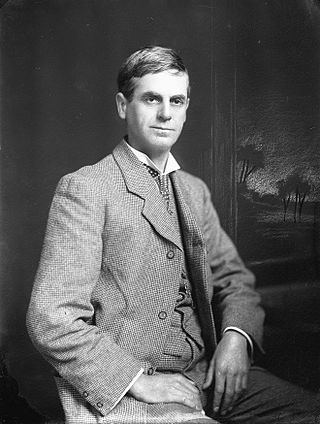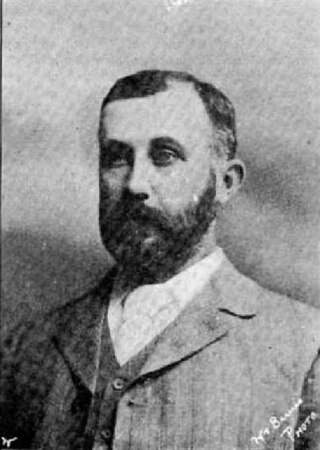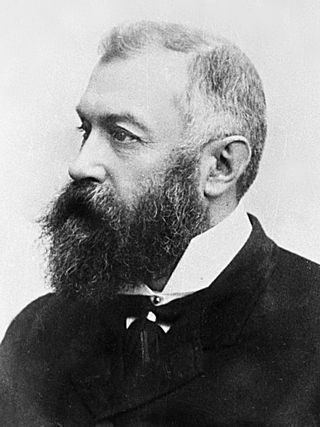
The 1896 New Zealand general election was held on Wednesday, 4 December in the general electorates, and on Thursday, 19 December in the Māori electorates to elect a total of 74 MPs to the 13th session of the New Zealand Parliament. A total number of 337,024 (76.1%) voters turned out to vote.

The 1905 New Zealand general election was held on Wednesday, 6 December in the general electorates, and on Wednesday, 20 December in the Māori electorates to elect a total of 80 MPs to the 16th session of the New Zealand Parliament. A total number of 412,702 voters turned out, with 396,657 voting in the European electorates.

George Warren Russell was a New Zealand politician from Christchurch. He served as Minister of Internal Affairs and Minister of Public Health in the wartime National government, and was responsible for the New Zealand government's response to the 1918 influenza epidemic.

Thomas Edward Taylor was a Christchurch mayor, New Zealand Member of Parliament, businessman and prohibitionist.

Richard Harman Jeffares Reeves was a New Zealand politician of the Liberal Party. He was acting Speaker of the Legislative Council in 1905.
Sydenham was a New Zealand parliamentary electorate, from 1881 to 1890 and again from 1946 to 1996. It had notable politicians representing it like Mabel Howard, Norman Kirk and Jim Anderton.
Riccarton is a former New Zealand parliamentary electorate. It existed from 1893 to 1978, and was represented by eight Members of Parliament.
Avon is a former New Zealand parliamentary electorate. It was created for the 1861 general election and existed until 1996. It was represented by 13 Members of Parliament and was held by Independents, Liberal Party or Labour Party representatives.
Kaiapoi was a rural New Zealand electorate, north of Christchurch in the Canterbury region of New Zealand from 1861 to 1946. It was represented by twelve Members of Parliament.
Christchurch was a parliamentary electorate in Christchurch, New Zealand. It existed three times. Originally it was the Town of Christchurch from 1853 to 1860. From the 1860–1861 election to the 1871 election, it existed as City of Christchurch. It then existed from the 1875–1876 election until the 1881 election. The last period was from the 1890 election to the 1905 election. Since the 1946 election, a similarly named electorate called Christchurch Central has been in existence.

Charles Lewis was an independent conservative Member of Parliament in New Zealand.
Richard Molesworth Taylor, also known as Sydenham Taylor, was a three-term New Zealand Member of Parliament. Born in London in 1835, he moved to Auckland on the Heather Bell in 1846. He travelled to Victoria in 1851, and later to New South Wales and participated in the gold rush before returning to Auckland in 1857. There he briefly joined the militia, serving in the New Zealand Wars, before becoming a government contractor. In 1869 he moved to Canterbury, working as a general contractor until becoming a Member of Parliament in 1886.

Edward Wingfield Humphreys was a New Zealand member of parliament representing Christchurch North from 1889 to 1890. He was also a farmer in Otago, and his extended family included a number of political figures.

Samuel Paull Andrews was a 19th-century politician in Christchurch, New Zealand. Originally from the Isle of Wight, he was the first working class man to become a Member of Parliament in his chosen country.

Ernest Eden George, known as Eden George, was born in New South Wales and came to New Zealand as a young man. He made his career in photography and was active in Auckland and Dunedin, but mainly in Christchurch. Entrepreneurial, combative and confrontational, he entered the political scene. In his early life, he stood at five elections to the New Zealand Parliament, but he came last at every occasion. Surprisingly, he was elected Mayor of Christchurch in 1892 without, unlike all his predecessors, having ever served as a councillor on Christchurch City Council before. He had a most difficult year, was soundly beaten at the next election and told councillors that they "should forget him, as he would forget them". Indeed, in 1906, his was the only photo of all the city's ex mayors that was not on display in the mayor's office.

The 13th New Zealand Parliament was a term of the New Zealand Parliament. It was elected at the 1896 general election in December of that year.

The 16th New Zealand Parliament was a term of the New Zealand Parliament. It was elected at the 1905 general election in December of that year.
John Crewes was a New Zealand Bible Christian minister, social worker and journalist. He was born in Grampound, Cornwall, England on 15 July 1847.
The 1911 Christchurch North by-election was a by-election during the 17th New Zealand Parliament held on 17 August that year in the Christchurch North electorate. It was triggered by the death of sitting member Tommy Taylor on 27 July and was won by his close friend and political ally, Leonard Isitt.
The City of Christchurch by-election of 1901 was a by-election held on 18 July 1901 during the 14th New Zealand Parliament in the urban seat of the City of Christchurch. The by-election was triggered by the resignation of conservative politician Charles Lewis and won by George John Smith.












